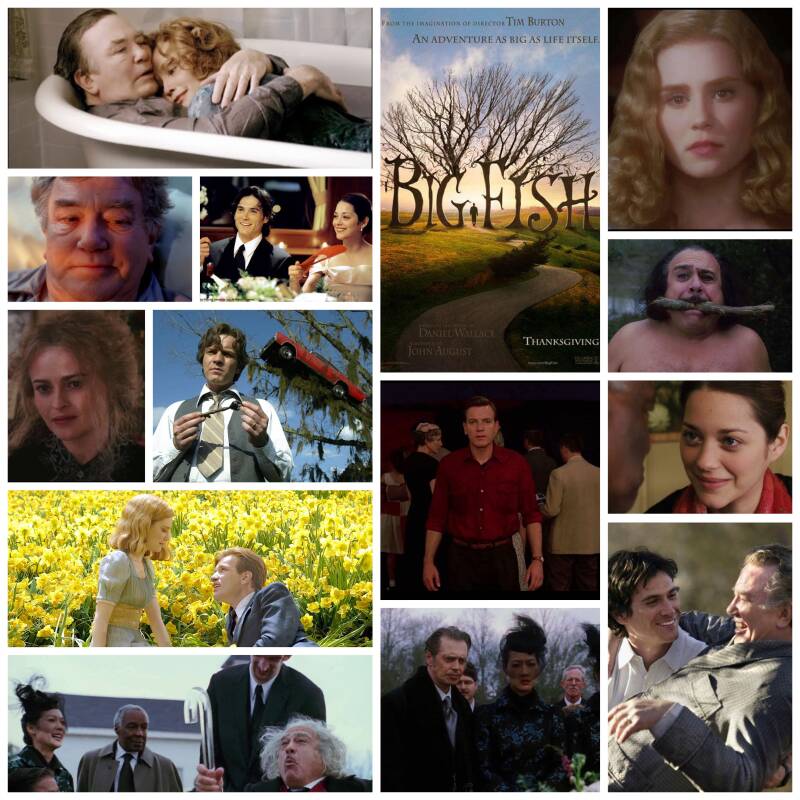

Stories that outlive us: reflections on the film Big Fish
What does it mean to "catch a big fish"? It's not about fishing, of course. It's about the thing we chase after our whole lives. Everyone has their own big fish: some are searching for love, others for meaning. Some hope to leave a mark, while others just want to be understood. The big fish is that one story we’re always trying to tell. About ourselves. About life. About what it all means.
In a sense, life is all about waiting, watching, trying. We stand by the water day after day. With bait or without. Sometimes, we think we almost caught it. Sometimes, we’re ready to give up. But if we’re lucky, it rises to the surface. Maybe just for a moment. But that’s often enough.
As British writer William Somerset Maugham once said, "Dreams are not an escape from reality, but a way to get closer to it." We all know what the real world looks like—the laws it follows, the demands it makes of those who live in it. But, when you stop and think about it, we don’t really know much about how things stand in this world. Why are we here? Why are we the way we are? How little of what we feel can truly capture our place in the universe? There are no answers that can’t be questioned. As a result, each of us essentially lives in our own little world. We look at everything through our unique filters—filters that can color everything in vivid hues or make it black and white, add interesting details or leave it unchanged.
Tim Burton’s Big Fish is exactly that kind of truth. At first glance, it's a whimsical fairy tale. There are giants, witches with glass eyes, hidden cities, and an incredible love story that feels too beautiful to be real. But the longer you watch, the clearer it becomes: this is not just a fairy tale for the sake of it. It’s memory. It’s longing. It’s a dream you wake up from with a lump in your throat, unable to explain why.
The color in this film is a language of its own. The brightest moments shine like memories: the sunlight in a childhood room, too golden to be real—but exactly how you remember it. Burton doesn’t show the world as it is. He shows it as we keep it inside ourselves. The spaces and sets are not made of facts, but of feelings. A little unreal. Like a stage. A little more symmetrical, a little cleaner. It’s not the world as it was—it’s the world as it’s told.
And to be real... Who actually knows what the world is supposed to be like?! Each of us sees the world in our own way, and that’s probably what makes it so diverse and interesting...



"A person tells their stories so many times that they become those stories."
This line is almost the backbone of the film. It doesn’t sound like a revelation, but if you think about it, it’s a truth we’ve known since childhood. We are not just what we’ve done. We are what we’ll be remembered for. What gets passed down. Perhaps not word for word. Perhaps exaggerated. But—honestly, in its own way. Sometimes, we embellish our stories subconsciously, to live a little longer in someone else’s memory.
And there’s something almost unbearably touching about that. Because *Big Fish* is not so much about fantasy as it is about distances. Between people. Between generations. Between what really happened and what we wish had happened. Between a father who couldn’t speak plainly and a son who just wanted the truth.
But maybe truth isn’t always direct. Maybe it comes in the form of a performance. A metaphor. A fish so big that you can’t catch it with bare hands. Maybe some things in life aren’t meant to be fully understood. They’re just meant to be seen.
And in the end, the big fish swims away. Calmly. Without a fight. It’s not the kind you can hold on to. And maybe that’s the truth right there. Not everything that matters stays with us forever. Some things appear at the right moment—for us to see them, understand them… and let them go.
The film doesn’t give exact answers. It doesn’t explain everything, nor does it resolve the themes of memory, farewell, or family. It simply offers one thing: maybe we live on in the stories we leave behind. And maybe… that’s enough.
"We all become the stories we tell about ourselves." The version of us that will be remembered might not be precise. A story should be alive..


Which part of you will become a story?.. And who will tell it?..


Add comment
Comments